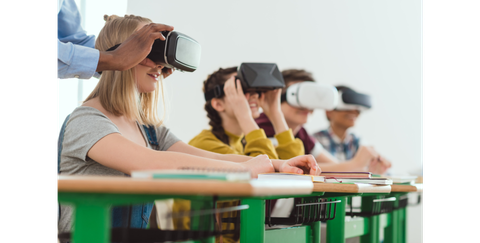Communities in Virtual Learning Spaces
Table of contents
Concerns
This research group is dedicated to exploring the constitution and evolution of communities in virtual learning spaces. Using social VR and interactive 3D technologies, it aims to explore and increase interactivity and engagement in digital educational environments. By analyzing the adoption and implementation of these technologies, we aim to transform pedagogical practices and promote an inclusive educational landscape that can provide educational access and experiences for all learners, regardless of their physical, cognitive or social conditions.
Main topics
- Development and evaluation of social VR applications for educational contexts
- Investigation of support models within online communities
- Design and implementation of immersive VR learning environments
Research questions
The research group "Communities in Virtual Learning Spaces" is interested in the organizational, didactic and individual level. It aims to take a holistic view of the object of investigation. The following central questions serve as a starting point.
Organizational level:
- What are the requirements for the design of learning and knowledge communities in virtual environments?
- What factors influence the suitability and implementation of (social) VR learning environments and tools for educational and communication purposes?
Didactic level:
- How should supervision concepts be designed to support online knowledge communities?
- How can (social) VR learning environments and interactive virtual 360-degree panoramic learning spaces be designed didactically to promote the learning experience and learning outcome?
Individual level:
- How can learners and learning facilitators build skills for proactive participation in communities in virtual environments?
- What factors influence the technology acceptance of (social) VR learning environments and tools?
Research approaches and methods
- The group uses both qualitative and quantitative research methods to gain insights into the dynamics of use and pedagogical effectiveness of VR in educational environments. This includes the development of prototypical learning environments and their empirical evaluation.
- Competencies for the implementation of design science research approaches and technology acceptance models as well as (meta-)statistical social research will be developed and expanded.
Further information
Current projects
|
Type of project |
Project title |
Funding body / qualification level |
Tasks of the group management |
Duration |
|
Research project |
Preliminary study on the OER initiative of Saxon universities |
HD Saxony |
Sub-project coordination and processing |
ongoing until 06/2024 |
|
Research and development project |
Connection of a virtual immersive 3D learning platform to the national education networking infrastructure using the domain example of an educational institution(AVILAB2) |
BMBF |
Sub-project coordination and processing |
ongoing until 09/2024 |
Completed projects
|
Type of project |
Project title |
Funding body / qualification level |
Tasks of the group management |
Duration |
|
Research and development project |
SOLL2: Social teaching/learning arrangement for the sustainable dissemination of new teaching/learning cultures |
SMWK |
Project coordination and processing |
09/2017 - 12/2018 |
|
Research and development project |
ISLA: Indicator-based social learning analytics for monitoring learning processes and learning objectives in virtual communities |
SMWK |
Project coordination and processing |
09/2017 - 12/2018 |
|
Research and development project |
Digital educational offerings in the real estate industry using virtual reality (DOmIcILE-VR) |
ESF and Free State of Saxony |
Work package management and processing |
05/2019 - 04/2022 |
|
Research and development project |
Promoting the participation of micro and small enterprises in further training through digital learning scenarios (weiter.digital) |
ESF and Free State of Saxony |
Sub-project coordination and processing |
06/2019 - 05/2022 |
|
Research and development project |
Further development and modernization of a teaching concept on product safety for university education (PROSUmEr) |
BAuA |
Project coordination and processing |
11/2017 - 05/2020 |
|
Research and development project |
TU Dresden Collaborative Online International, Interdisciplinary & Intercultural Learning |
DAAD |
Sub-project coordination and processing |
10/2020 - 09/2021 |
Dyrna, J. (2022). Wohnungsabnahmen virtuell trainieren: Entwicklung eines Virtual Reality-Lernszenarios für Immobilienverwaltende. MedienPädagogik: Zeitschrift für Theorie und Praxis der Medienbildung, 47, 172-195. https://doi.org/10.21240/mpaed/47/2022.04.09.X
Dyrna, J., Brade, M., Liebscher, M, & Bohn, T. (2021). Can Virtual Reality Enhanced Role-Play Scenarios Using Mobile Devices Enrich Classroom Learning? A Case Study. In 7th International Conference on Education. Empowering Learners In a Digital World (S. 86). TIIKM. [Joint Best Presentation Award]
Dyrna, J., Gnauck, D., & Kasper, B. (2019). PROSUmEr - Ein interaktives, nachhaltiges Lehrkonzept zur proaktiven Produkt- und Maschinensicherheit für die universitäre Ausbildung. Sicher ist sicher, 70, 488-492.
Dyrna, J., Stöhr, K., & Pippig, M. (2022). Do learners experience spatial and social presence in interactive environments based on 360-degree panoramas? A pilot study and future research agenda. In T. Köhler, E. Schoop, N. Kahnwald, & R. Sonntag (Hrsg.). Communities in New Media. Digitality and Diversity Overcoming Barriers with digital Transformation (S. 259-268). TUDPress.
Clauss, A. (2017). Rahmenbedingungen und Anreize zur Gestaltung proaktiver Lern- und Wissenscommunities: Anforderungen an das Community Management. In T. Köhler, E. Schoop, & N. Kahnwald (Eds.), Wissensgemeinschaften in Wirtschaft, Wissenschaft und öffentlicher Verwaltung. 20. Workshop GeNeMe‘17 Gemeinschaften in Neuen Medien (S. 1–12). Sächsisches Digitaldruck Zentrum.
- Analyzing social interaction in virtual learning communities: Investigating how social presence and a sense of community can be fostered in virtual learning environments.
- The role of gamification in virtual learning spaces: How gamification elements influence learner engagement and motivation in VR-based educational environments.
- Accessibility in virtual learning environments: Exploring the accessibility of VR learning applications for individuals with physical or sensory impairments.

Head of Research Group
NameAlexander Clauss M. Sc.
Participant in the graduate program „Education & Technology“
Send encrypted email via the SecureMail portal (for TUD external users only).
Visiting address:
BSS, 4th floor, room 437 Strehlener Str. 22/24
01069 Dresden
 © peroptato.de
© peroptato.de
Deputy Head of Research Group
NameMr Jonathan Dyrna M.Sc.
Research associate
Send encrypted email via the SecureMail portal (for TUD external users only).
Visiting address:
BSS, 4th floor, room 449 Strehlener Str. 22/24
01069 Dresden

